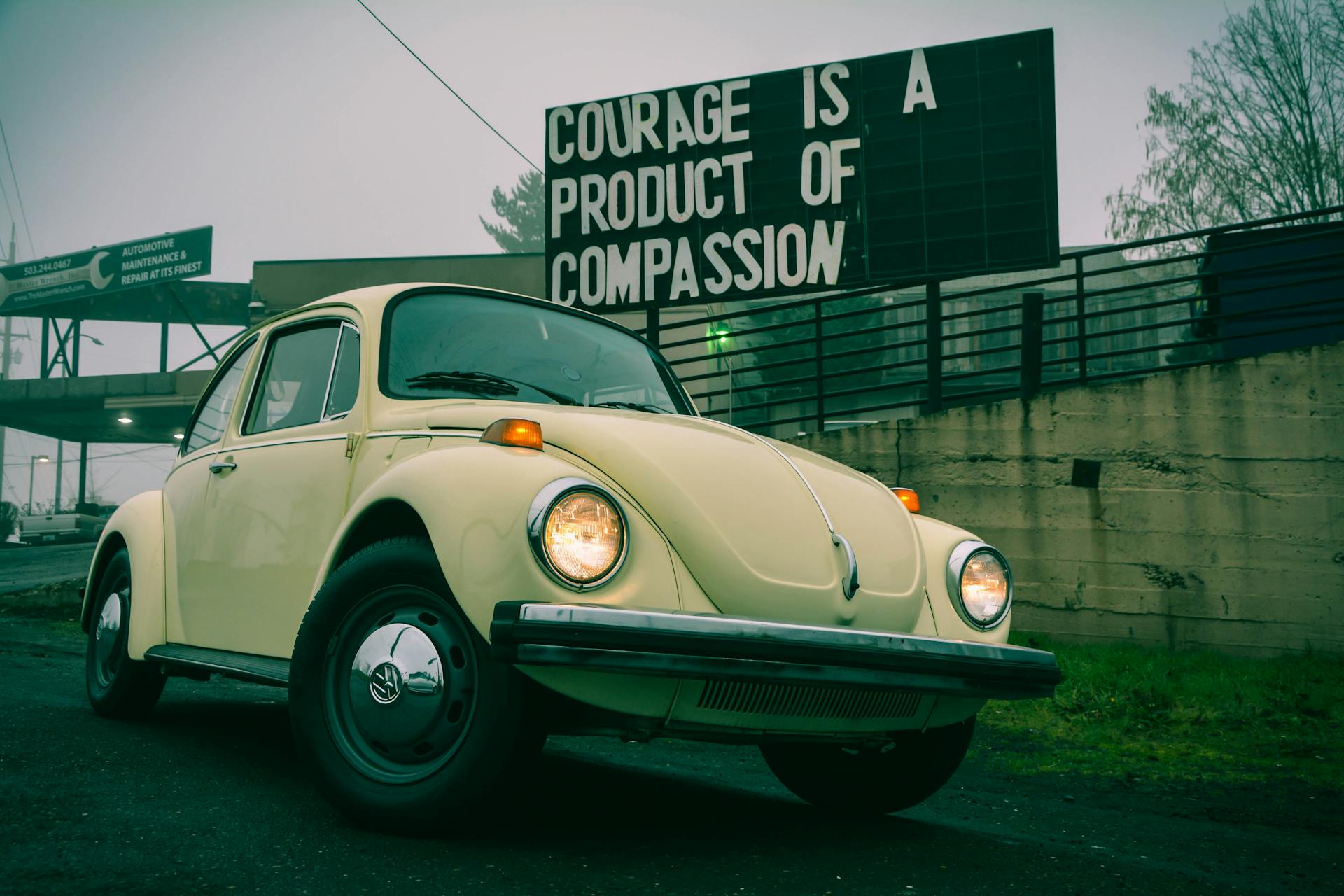
If you use your personal vehicle for business purposes, you may wonder if your personal auto insurance covers business use. In most cases, the answer is no, your personal auto insurance does not cover business use.
Typically, personal auto insurance policies exclude business use, unless you have a specific business use endorsement. This means that if you're involved in an accident while driving for work, your personal insurance may not cover the damages.
Most personal auto insurance policies have a limit on the number of business miles you can drive per year before coverage is denied. For example, some policies may allow up to 5,000 business miles per year, while others may have stricter limits.
You might enjoy: Vehicle Insurance
What's Covered
Your personal auto insurance might not cover business use, so it's essential to understand what's covered under a commercial auto insurance policy. HNOA insurance, for instance, provides liability coverage for accidents that occur during work-related uses of rented cars or personal vehicles.
Commercial auto insurance covers business vehicles, including passenger cars, vans, pickups, and SUVs, as well as larger commercial vehicles like cement mixers and cranes. If you or your driver is at fault in an accident, the policy will pay for repair bills, medical bills, lost wages, legal fees, and even funeral expenses.
In a basic plan, third-party damages will be covered, as well as your own care and repair. Medical expenses for you, your drivers, and any passengers that are injured will be covered. Lost wages can also be covered if the vehicle is out of commission.
Here's a breakdown of what's typically covered in a commercial auto insurance policy:
- Repair bills: All damages to your vehicle should be covered.
- Medical bills: Medical expenses for you, your drivers, and any passengers that are injured will be covered.
- Lost wages: Insurance plans can cover money lost while the vehicle is out of commission.
- Legal fees: Policies will cover your legal fees and potentially the other side if you or your employee were at fault.
- Pending lease payments: If you are leasing the vehicle and it is damaged beyond repair, insurance may cover the money that you still owe on it.
- Funeral expenses: A basic plan can cover such costs.
Additionally, you may want to consider adding coverage for damage that doesn't result from a collision, such as vandalism or weather-related damages.
What's Not Covered?
Most personal auto policies don't cover business-related accidents, which can leave you financially exposed. This is a crucial fact to understand, especially if you use your vehicle for work.
If you're driving for commercial purposes and only have personal car insurance, you're essentially driving without insurance. This means you'll have to pay out-of-pocket for any legal, repair, and car rental costs.
There are some exceptions to this general rule, but they're limited. For example, if you drive a private passenger auto, pickup or van, or trailer used with either of these, you might be covered.
However, even with these exceptions, it's essential to note that every policy has its nuances. Exclusions, such as using a company vehicle for ride-sharing services without proper endorsement, can leave you uncovered.
To avoid any confusion, it's vital to understand the policy exceptions. For instance, if a vehicle is used more for personal than business purposes, this might violate the terms of your commercial policy. You'll need to maintain a clear distinction and documentation of use.
Here are some key policy exceptions to keep in mind:
- Personal vs. Business Use Ratio: If a vehicle is used more for personal than business purposes, this might violate the terms of your commercial policy.
- Exclusions: Certain activities might be excluded from coverage, such as using a company vehicle for ride-sharing services without proper endorsement.
- Family Members: Some policies might not cover family members using the vehicle for personal errands, even with permission.
Exceptions and Special Cases
Exceptions to the general rule of personal auto insurance not covering business use exist. Some personal auto policies may be more restrictive toward pickups or vans, including gross vehicle weight (GVW) limitations or clauses that restrict coverage to owned pickups or vans only.
Exceptions to the exceptions can bring you back to Square 1. For instance, if a vehicle is used more for personal than business purposes, it might violate the terms of your commercial policy. You must maintain a clear distinction and documentation of use.
Certain activities, like using a company vehicle for ride-sharing services without proper endorsement, may be excluded from coverage. Be aware of these exclusions to avoid being left uncovered.
Some policies might not cover family members using the vehicle for personal errands, even with permission. This is a critical detail to clarify with your insurer.
Exceptions to Exceptions
Exceptions to Exceptions can be confusing, but let's break it down. Some personal auto policies may be more restrictive toward pickups or vans, including a gross vehicle weight (GVW) limitation or a clause that restricts coverage to owned pickups or vans only.

You should always consult your policy before driving any pickup or van for work. This is crucial to avoid being uncovered in case of an accident.
Certain activities might be excluded from coverage, such as using a company vehicle for ride-sharing services without proper endorsement. This can leave you with unexpected expenses if you're involved in an accident.
Some policies might not cover family members using the vehicle for personal errands, even with permission. This is a critical detail to clarify with your insurer.
To navigate these grey areas, it's essential to communicate with your insurance provider. They can help clarify your policy's stance on personal use, ensuring you're covered in all necessary scenarios.
Here are some key exceptions to keep in mind:
Remember, the goal of commercial auto insurance is to protect your business and its assets. While it can accommodate personal use to a degree, maintaining clear boundaries and understanding your policy's limitations is crucial.
Additional Insured or Waiver of Subrogation
If you're asked to add someone as an additional insured on your policy, it's likely a commercial requirement.
Personal auto policies usually won't allow this, and the underwriter may even cancel your policy due to commercial auto exposure.
To meet commercial auto insurance requirements, you'll need a commercial auto policy, especially if you're submitting a certificate of insurance with auto liability coverage.
This is a common scenario, especially if you're working with clients who require this as part of your contract.
Specialized Equipment Attached
If you have specialized equipment attached to your vehicle, such as booms, lifts, cranes, welders, or compressors, you're not eligible for a personal auto policy.
Having commercial equipment on your vehicle can expose you to liability and physical damage risks that a personal auto policy can't cover.
You may find that a commercial policy is a better fit for your needs, as it can provide more comprehensive protection for your exposures.
Commercial auto policies can cover the liability associated with operating your equipment, which is a critical consideration if you're using your vehicle for business purposes.
This is especially important if you're working with heavy machinery or operating in high-risk environments.
Here's an interesting read: Business Equipment Breakdown Insurance
Business Use Scenarios
If you're using your personal vehicle for business purposes, you need to understand the business use scenarios that affect your coverage. If you're making deliveries, for example, your personal auto insurance policy likely won't cover liability, physical damage, or medical payments.
You're probably not covered if you're transporting people or goods for hire, such as through a taxi service, motor carrier, or delivery service. This is known as public or livery conveyance use.
Here are some common business use scenarios and their implications for your coverage:
If you're only driving to and from work or using your vehicle for sales calls, you're likely okay with your personal auto insurance policy. However, it's always best to check with your insurance broker to confirm your coverage.
Employee Usage
If your employees use their personal vehicles for work-related tasks, you still need commercial auto insurance. This policy covers your employees while they're on the clock, ensuring that any accidents or damages are taken care of.

Commercial auto insurance is a must-consider for businesses that don't own vehicles but still use them for work purposes. This includes renting cars for business trips or employees using their personal vehicles for work errands.
You might have employees who use their personal vehicles for work-related tasks, such as making deliveries or running business errands. In these cases, hired and non-owned auto liability insurance is a must-have.
Here are some key things to keep in mind:
If your employees use their personal vehicles for work, you'll need to consider HNOA insurance to fill the gap that personal or commercial auto policies might not cover. This will help protect your business, employees, and assets from unforeseen events on the road.
Types
Personal vehicles used for business can be a bit tricky to insure. You might need commercial auto insurance if your vehicle is a significant part of your business operations.
If you're a sole proprietor, using your personal car for business, you might still need commercial auto insurance. This is especially true if your vehicle is used for activities like delivering goods or visiting clients regularly.
You might like: What Type of Business Insurance Do I Need

Commercial auto insurance can cover a wider range of vehicles than personal auto insurance, including box trucks, service utility vehicles, and more. It's tailored to accommodate the diverse needs of businesses.
Here are some examples of vehicles that commercial auto insurance can cover, but personal auto insurance might not:
- Box trucks
- Service utility vehicles
- More
Deliveries
If you're making business deliveries in a vehicle, your personal auto insurance might not cover liability, physical damage, medical payments, or uninsured motorists. This is because there are two exclusions and limitations that could apply to your business.
The Public Or Livery Conveyance Use Exclusion is a big concern, as it refers to transporting people and/or goods for hire, such as by a taxi service, motor carrier, or delivery service. This exclusion can lead to problems if you're not aware of it.
Any delivery operations you might have are excluded from your personal auto insurance, even if your business isn't delivering in the classical sense. It's best not to leave it up to the claims adjuster to decide if delivery is "incidental to your business."
As a contractor, you might opt for a commercial auto policy to cover operations outside of operating the vehicle. This type of policy can be a lifesaver if you're regularly making deliveries or visiting clients.
For more insights, see: Auto Service and Repair Insurance
Commuting and Sales Calls
If you only use your vehicle for commuting and sales calls, you're in a relatively straightforward situation. You don't need a commercial automobile policy.
Commuting to and from work is a common scenario, and it's not considered business use. This is the same for doing sales calls, product demos, or consultation visits in a vehicle that you own personally.
To clarify, as long as you're not using your vehicle for work-related tasks beyond commuting and sales calls, your personal auto insurance should cover you. Just make sure to tell your insurance broker what your profession is and how you will be using the vehicle.
Here's an interesting read: How Does Bike Insurance Work
Decals
Decals can be a major red flag for insurance companies. If you have business decals on your vehicle, most personal auto insurance carriers will not quote your insurance.
Having business decals on your vehicle can also lead to policy cancellation if the insurance company finds out about them. This is because they suspect you may be using your vehicle for commercial purposes.
Business decals on your vehicle can raise suspicions with claim adjusters too. If you're involved in an accident, they'll investigate to determine what you were doing and whether it falls under a commercial purposes exclusion.
Car Basics
Commercial auto insurance is a must-have for businesses that use vehicles for work. It's not just another cost of doing business, but a crucial investment to protect your business and its employees.
There are three categories of people covered by commercial auto insurance: the named insured, permissive users, and omnibus users.
The named insured is usually the business owner, and they'll be covered even if they didn't participate in an accident directly.
Permissive users are individuals who have permission to drive, but aren't specifically covered by name or as a household member.
Omnibus users extend coverage to those who are vicariously liable, meaning they can be held liable for any accident or negligence committed by permissive users.
If you purchase coverage for permissive users and omnibus users, in addition to coverage for the named insured, you'll be well on your way.
Here are the three categories of people covered by commercial auto insurance:
Frequently Asked Questions
Can you have personal insurance on a company car?
Company cars can be used for personal needs, but you'll need to provide your own insurance coverage for that use
Can personal car insurance be a business expense?
Personal car insurance may be a business expense if used for business-related purposes, such as driving for work or running a business. Check if your business use qualifies for tax deductions
Sources
- https://www.trustedchoice.com/insurance-articles/business-use-of-my-personal-vehicle/
- https://www.biberk.com/articles/does-commercial-auto-insurance-cover-personal-use
- https://isu-armac.com/does-commercial-auto-insurance-cover-personal-use/
- https://www.landesblosch.com/blog/commercial-vs-personal-auto-insurance-whats-the-difference
- https://www.embroker.com/blog/does-my-personal-auto-insurance-cover-business-use/
Featured Images: pexels.com


